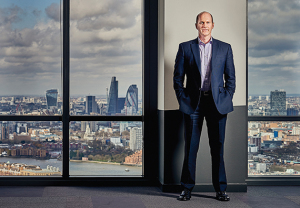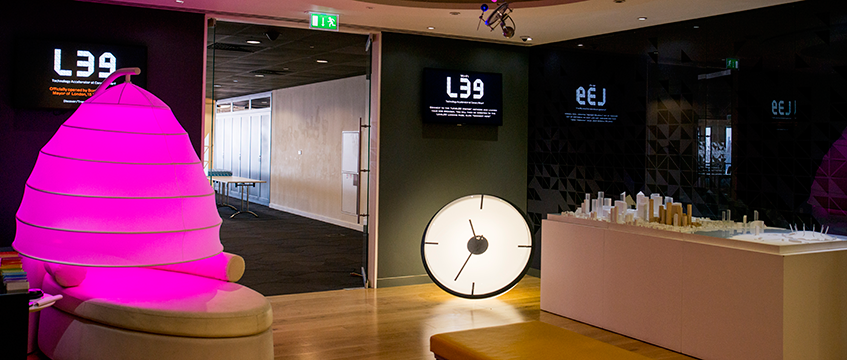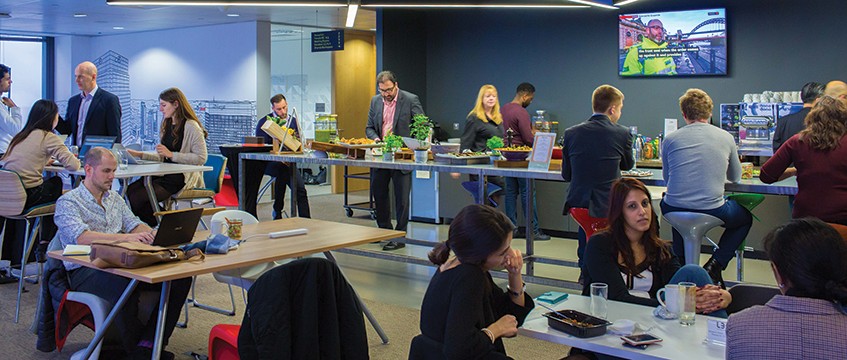Canary Wharf fintech accelerator Level39 has increased its membership by 61% since the EU referendum and two member companies are in talks to secure leases on the wider estate.
Revolut, the fast-growing payments app disrupting the travel money market, is planning to lease new space on the estate. Digital Shadows, a cyber-security firm working for the Bank of England and US government intelligence agency the National Security Agency, which has grown from five London staff to more than 100, is also close to signing a lease.

Owned wholly by Canary Wharf Group, the accelerator was founded in 2013 and has since grown to an 80,000 sq ft flexible workspace occupying the 39th, 24th and 42nd floors of One Canada Square, E14, from where start-ups overlook the headquarters of potential clients such as HSBC, Barclays and Citi. Membership now totals 220.
To join, the technology start-ups must meet the selection criteria of having developed a viable product, have the ambition to address billion-dollar market opportunities, and be able to prove they can pay the market rent.
Brexit is causing only a “slight distraction” for the fintech firms, says Ben Brabyn, head of Level39. “The elite, global talent pool we have here is perhaps less affected than other industries.”
Start-ups which have joined Level39 since the EU referendum
■ Spaceti: a proptech company focused on transforming the customer experience within buildings, digitizing occupational health, safety and well-being and leveraging the Internet of Things to increase productivity.
■ Cashoff: a cloud-based e-banking solutions system that collects anonymous financial data from final consumers from different sources.
■ AlphaQuants: a tech firm specialising in the application of quantitative and machine learning techniques for finance.
■ Cydefence: a team of computer scientists and former investment bankers offering information security advice to financial firms.
While he acknowledges passporting and access to talent, which could be affected by Brexit, are concerns for the entrepreneurs, he says other pull factors are more important. These include access to diverse talent and venture capital, support from regulators, and England’s common law framework, which favours innovation.
Community of pragmatists
“This is a community of pragmatists, and pragmatists see opportunity in everything and act on it. So no-one really missed a beat. People keep coming in and yes, there’s some uncertainty there, but it’s dwarfed compared with, for example, the challenges presented to financial services by new entrants in other parts of the world.”
Corporate demand for firms that address cybersecurity, productivity, and corporate trust issues is shaping the characteristics of start-ups joining the accelerator, Brabyn says.
There are 26 cyber security companies at Level39. These, Brabyn says, “hunt as a pack” and operate as a “community of mutual referral”.
“That’s a really interesting riff on the future of work, that by creating these kind of conditions, we’re not only making sure that people are right on the threshold of their customers, but that they perform individually and collectively better,” Brabyn says.
“Time and again we hear from Level39 companies that compared with being in a community that is a random selection of entrepreneurs, they are stimulated by the external engagement.
“And that means that when you are a business developer or a tech developer, your productivity increases, because you are constantly using similar approaches, and engaging with similar potential customers.”
In October, the accelerator launched the UK cyber demonstration centre, a government-backed facility for cyber SMEs to demonstrate their capabilities, products and services to potential clients and international markets.

Adapting the footprint
Canary Wharf offers a mix of hot-desking, fixed desks and private offices for Level39 firms, allowing them to adapt their footprint quickly and easily.
Brabyn describes the accelerator as a “B2B environment”, unlike workspaces that “trivialise entrepreneurship”.
He says: “This is a place where people are dealing with really meaty, sometimes very complex problems. So you’ll see that around here there aren’t ping pong tables or beer on tap. This is absolutely a place where we want to make sure every company, no matter if it’s only two people, can stand shoulder to shoulder with a senior executive at a bank, and convey credibility.
“Because you’re never going to sign a contract with a bank if it’s not certain that you’re enterprise grade.”
Level39 members have access to “enterprise-grade infrastructure”, as well as support from and access to institutions such as the Financial Conduct Authority, global investors and top academics. University College London occupies an adjacent floor.
Brabyn says Level39 will consider taking space in the New District, Canary Wharf’s 20-acre mixed-use regeneration project, which will include just under 2m sq ft of offices, the first phase of which is due to be delivered in 2019. However, no relocation has been confirmed.
New wave of occupiers
The recent lease negotiations demonstrate the accelerator’s potential to support a generation of fintech companies that will represent a new wave of occupiers in London. They also prove the accelerator’s success in supporting its stated aim to increase the diversification of the Canary Wharf estate.
“Something I go to sleep at night thinking, how can we make sure the companies we support here are actually transforming the prospects of HSBC, Citi and Barclays as well? Because the license that you have, the agility of a smaller organisation, can make such a difference when it engages properly with the global reach – the thousands of smart people employed around the world by the companies around us,” says Brabyn.
“The companies here are equipped and advised to play a global game.”
To send feedback, e-mail Louisa.Clarence-Smith@egi.co.uk or tweet @LouisaClarence or @estatesgazette











